I’ll tell you all a story that perhaps you do not know
It all happened in Australia quite some time ago
I’ll tell you of Tom Barker from Westmoreland he came
From an early age he knew that he was born to Fan the Flames
Many in their youth and prime they left their own backyard
Back before the First World War when times were tough and hard
By boat and train and road they came tired legs and blistered feet
And they wound up here in Sydney on Castlereagh Street.
Gladiators of the Working Class, heroes of mine
Who travelled down this dark road long before my time
Your actions and the words you spoke are shining in my mind
As I’m blowing down this old dusty road.
Tom Glynn and Peter Larkin they came from Erin’s Shore
There was Jack Hamilton and J.B. King, Charlie Reeve and many more
And Donald Grant I see him still in the Sydney Domain
Where Sunday after Sunday thousands thrilled as he proclaimed
“O the men who made this Empire they made it for the few
“Who feast upon the profits of the labours that we do
“And now they want the working man to fight for them as well
“Let those who own this Empire go and fight for it themselves”
Prime Minister Billy Hughes that “Little Digger” sod
He was elected by the workers and he thought that he was God
Says he for the mines in Broken Hill and the Queensland shearing sheds
We’ll introduce Conscription and get rid of all these Reds
O Billy was astonished when the Referendum failed
He rounded up the Wobblies and he filled up all his jails
With all the wealth and all his might he made a pretty show
But he couldn’t get away with it when the People voted NO.
A cartoon in the Wobbly paper it had it cut and dried
It showed the rich man raking in the loot and the soldier crucified
And the editor he was thrown in jail and the working folks agreed
That they’d kick up bloody murder till they saw Tom Barker freed.
And the Sydney Twelve stood trial when some buildings were burned down
And the evidence it was stitched up by Detectives for the Crown
And the brainless brutal jury found them guilty with a leer
And the Judge says I’ll be lenient and give you ten to fifteen years.
Tom Barker was deported to Chile was sent away
Where he promptly organised the docks in Valparaiso Bay
And he wound up in London where the people made him Mayor
And upon St Pancras Town Hall he raised the Red Flag there.
He sneaked back into Sydney in the year of ’32
And he watched the Anzac Day parade and his prophecies come true
For these Heroes in their shabby clothes who fought the Hun and Turk
Had come home to find that all they’d won was a lifetime of no work.
Gladiators of the Working Class, Heroes of mine
If we only had Tom Barker here in all his youth and prime
His actions and the words he spoke are shining in my mind
As I’m blowing down this old dusty road.
I stood at the foot of your grave Tom Glynn here in Botany Bay
In the shadow of Long Bay jail where they locked you all away
And I made a vow to your memory as I stood on your burial ground
That I’d write this song and I’d sing it in your native Galway town.
It all happened in Australia quite some time ago
I’ll tell you of Tom Barker from Westmoreland he came
From an early age he knew that he was born to Fan the Flames
Many in their youth and prime they left their own backyard
Back before the First World War when times were tough and hard
By boat and train and road they came tired legs and blistered feet
And they wound up here in Sydney on Castlereagh Street.
Gladiators of the Working Class, heroes of mine
Who travelled down this dark road long before my time
Your actions and the words you spoke are shining in my mind
As I’m blowing down this old dusty road.
Tom Glynn and Peter Larkin they came from Erin’s Shore
There was Jack Hamilton and J.B. King, Charlie Reeve and many more
And Donald Grant I see him still in the Sydney Domain
Where Sunday after Sunday thousands thrilled as he proclaimed
“O the men who made this Empire they made it for the few
“Who feast upon the profits of the labours that we do
“And now they want the working man to fight for them as well
“Let those who own this Empire go and fight for it themselves”
Prime Minister Billy Hughes that “Little Digger” sod
He was elected by the workers and he thought that he was God
Says he for the mines in Broken Hill and the Queensland shearing sheds
We’ll introduce Conscription and get rid of all these Reds
O Billy was astonished when the Referendum failed
He rounded up the Wobblies and he filled up all his jails
With all the wealth and all his might he made a pretty show
But he couldn’t get away with it when the People voted NO.
A cartoon in the Wobbly paper it had it cut and dried
It showed the rich man raking in the loot and the soldier crucified
And the editor he was thrown in jail and the working folks agreed
That they’d kick up bloody murder till they saw Tom Barker freed.
And the Sydney Twelve stood trial when some buildings were burned down
And the evidence it was stitched up by Detectives for the Crown
And the brainless brutal jury found them guilty with a leer
And the Judge says I’ll be lenient and give you ten to fifteen years.
Tom Barker was deported to Chile was sent away
Where he promptly organised the docks in Valparaiso Bay
And he wound up in London where the people made him Mayor
And upon St Pancras Town Hall he raised the Red Flag there.
He sneaked back into Sydney in the year of ’32
And he watched the Anzac Day parade and his prophecies come true
For these Heroes in their shabby clothes who fought the Hun and Turk
Had come home to find that all they’d won was a lifetime of no work.
Gladiators of the Working Class, Heroes of mine
If we only had Tom Barker here in all his youth and prime
His actions and the words he spoke are shining in my mind
As I’m blowing down this old dusty road.
I stood at the foot of your grave Tom Glynn here in Botany Bay
In the shadow of Long Bay jail where they locked you all away
And I made a vow to your memory as I stood on your burial ground
That I’d write this song and I’d sing it in your native Galway town.
×
![]()


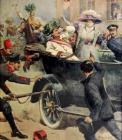
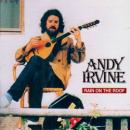
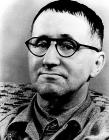
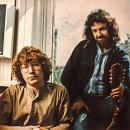
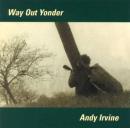

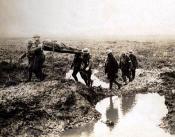
Parole e musica di Andy Irvine
La canzone che apre il suo album “Way Out Yonder”
“In their early and most vociferous career in Australia, just before, during and after the First World War, they stood up in a rage against the Government’s plan to introduce Conscription.
When the people of Australia–twice–voted against Conscription, the Government under W.M. Hughes (“The Little Digger”) decided to make the IWW illegal. This it did by fair means and foul. Mainly the latter. Barker was, at the time, editor of the IWW newspaper, Direct Action and he was jailed for printing a cartoon of a soldier, crucified on a guncarriage while Mr. Fat–the Financier–raised his glass to war profits.
I first heard of Tom Barker in London when I was a young man. He was famous for having flown the Red Flag from St Pancras Town Hall, while he was Mayor there.
The IWW hall in Sydney was originally at 330 Castlereagh Street. An address that no longer exists today. After membership blossomed in 19–, the Wobblies moved to bigger premises at 403 Sussex Street. This area has also changed dramatically and there is no sign of a Wobbly hall in Sydney today.” (Andy Irvine)
I Gladiatori di Andy Irvine sono i dirigenti della sezione australiana del sindacato Industrial Workers of the World, e in particolare Tom Barker, che fu direttore di “Direct Action”, giornale dell’organizzazione, che prima, durante e dopo la Grande Guerra lottarono strenuamente contro la coscrizione obbligatoria che il primo ministro Hugues tentò per ben due volte inutilmente di introdurre attraverso referendum.
Il 23 settembre 1916 quasi tutte le persone citate in questa canzone, tutti membri o simpatizzanti dell’IWW, furono arrestate con le gravissime accuse di tradimento, sedizione e boicotaggio. I “Sydney Twelve” furono rilasciati solo a Grande Guerra finita, nel 1920.
Hughes perse la prima consultazione popolare sulla coscrizione nel 1916 ma non si diede per vinto, lasciò il partito, ne fondò uno proprio, ritornò al potere, promosse un nuovo referendum alla fine del 1917, perseguitò pacifisti e attivisti anti-coscrizione (con l’arresto di molti dirigenti socialisti, dell’IWW e di direttori dei giornali favorevoli al NO), mise in campi di concentramento migliaia di cittadini di origine tedesca, perse di nuovo la consultazione popolare…
E intanto oltre 60.000 ragazzi australiani morirono a Gallipoli e negli altri teatri di guerra in Asia, nel Pacifico e in Europa, oltre 150.000 i feriti.